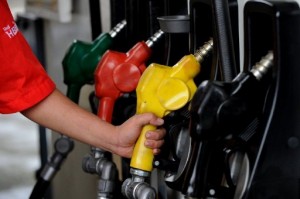Big oil firms announce uniform gasoline, diesel price cuts
MANILA, Philippines—Oil companies said separately on Friday that they will have lowered gasoline and diesel prices by early Saturday morning to reflect softer prices in the international market.
Petron, Shell, Chevron and Seaoil will reduce gasoline prices by P1.70 per liter and diesel prices by P0.25 per liter.
They said this would reflect “international price movements” in the commodity.
As of presstime Friday night, the other oil companies had yet to announce any planned price adjustments. But oil firms operating in the Philippines tend to impose uniform price movements since the country imports about 90 percent of its fuel requirements.
Industry experts earlier said that while international prices were on a higher trend last week because of higher global demand and political volatility in the oil-producing regions, there has been some price resistance in the domestic market because of the price increases imposed recently.
Article continues after this advertisementIn the month of July alone, pump prices were increased four times and rolled back just once, not including this latest price drop.
Article continues after this advertisementThe oil companies cited foreign exchange and international product price movements for the price increases.
Business leaders said entrepreneurs will bear the impact for now and expressed the hope that such price spikes are just temporary reactions to the volatile situation in Egypt.
Energy experts explained that when price hikes reach certain levels, price resistance sets in. Since the price increases of the last few weeks were substantial, traders cashed in on their gains with more sales, neutralizing projected higher demand and prices this week.
Since the Philippines imports more than 90 percent of its fuel products and because the local market is very small in relation to the global oil trade, anything from foreign exchange movements to political developments and global price speculation still greatly influence local prices.
For example, while Syria and Egypt are not oil producers, fears of a spillover of the disturbances into oil-producing countries tend to spook markets, driving prices up.
Industry experts said gasoline is also vulnerable to higher demand during the summer driving season in the United States, the world’s top gasoline consumer, and continued economic growth in the No. 2 consumer, China.
